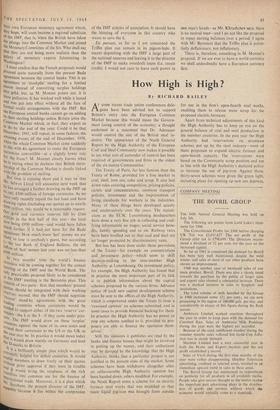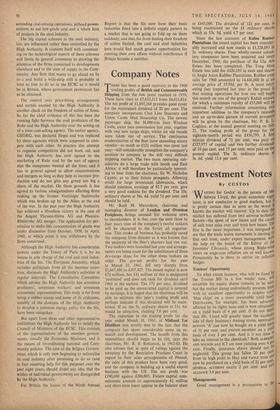How High is High ?
By RICHARD BAILEY Asome recent trade union conferences dele- gates have been advised not to support Britain's entry into the Eueopean Common Market because this would mean the Govern- Ment losing control of the economy; a thought enshrined in a statement that Dr. Adenauer would control the size of the British steel in- dustry. The appearance of the Ninth General Report by the High Authority of the European Coal and Steel Community now makes it possible to see what sort of surrender of control has been required of governments and firms in the oldest of the six-nation Communities.
The Treaty of Paris, far less famous than the Treaty of Ronne, provided for a free market in coal, steel, iron ore, coke and scrap. It also laid down rules covering competition, pricing policies, cartels and concentrations, common 'transport policies, investment and the improvement of living standards for workers in the industries. Many of these things have developed quietly and unobtrusively over, the years. The statisti- cians at the ECSC Luxembourg headquarters have done a very fine job in collecting and codi- fying information on wages, social service bene- fits, family spending and so on. Railway rates have been levelled out so that coal and steel are no longer protected by discriminatory rates.
But less has been done under those provisions of the Treaty—for example on concentrations and investment policy—which seem to shift decision-making to the- nine-member High Authority at Luxembourg. On investment policy, for example, the High Authority has found that in practice the most important part of its task is to publish information about the capital schemes proposed by the various firms. Advance notice of each new capital development scheme must be sent to the offices of the High Authority, which is empowered under the Treaty to issue a 'reasoned opinion' on schemes submitted, and in some cases to provide financial backing for them. In practice the High Authority has no power to stop any scheme notified to it, provided its pro- posers are able to finance the operation them- selves.
Still, the opinions it publishes are read by the banks and finance houses that might be involved in putting up the money, and their enthusiasm may be damped by the knowledge that the High Authorit■ thinks that a particular project is not justified in the present state of the market. Some schemes have been withdrawn altogether after an unfavourable High, Authority opinion has been handed down, others modified. For example, the Ninth Report notes a scheme for an electric furnace steel works that was modified so that more liquid pig-iron was brought from outside for use in the firm's open-hearth steel works, enabling them to release more scrap for the proposed electric furnaces.
Apart from technical adjustments of this kind the High Authority has to keep an eye on the general balance of coal and steel production in the member countries. In the past year the High Authority had 'reservations' on seventeen schemes put up by the steel industry—most of them proposals to expand electric furnace and open-hearth capacity. The 'reservations were based on the Community scrap position and are in line with the High Authority's declared policy to increase the use of pig-iron. Against these, thirty-seven schemes were given the green light, including plans for opening up new ore deposits, extending coal-mining operations, pithead power- stations to use low-grade coal and a whole host of projects in the steel industry.
The big capital schemes in the steel industry, too, are influenced rather than controlled by the High Authority. It contents itself with comment- ing on the technological aspects of these schemes and limits its general comments to drawing the attention of the firms concerned to developments elsewhere and to the state of supply in the Com- munity. Any firm that wants to go ahead on its oe,a and build a wide-strip mill is probably at least as free to do so in the ECSC as it would be in Britain, where government permission has to be obtained.
The control over price-fixing arrangements and cartels exerted by the High Authority is another check on the freedom of action of firms. So far the chief evidence of this has been the running fight between the coal producers of the Ruhr and the High Authority over the setting-up of a joint coal-selling agency. The earlier agency, GEORG, was declared illegal and was replaced by three agencies which were supposed to com- pete with each other. In practice this attempt to organise competition did not work out, and the High Authority has now agreed to the marketing of Ruhr coal by the sort of agency that the companies wanted all the time; and it has in general agreed to allow concentrations and mergers so long as they help to increase pro- duction and do not give any group too big a share of the market. On these grounds it has agreed to various amalgamations affecting firms making up the former Vereinigte Stahlwerke which was broken up by the Allies at the end of the war. In the past year the High Authority has achieved a bloodless victory in the case of the August Thyssen-Hiltte AG and Phoenix- Rheinrohr AG merger. The application for per- mission to make this concentration of giants was under discussion from October, 1958, to April, 1960, at which point it was withdrawn by the firms concerned.
Although the High Authority has considerable powers under the Treaty of Paris it is by no means in sole charge of the coal and steel indus- tries of the Six. The European Assembly, which includes politicians from all the member coun- tries, discusses the High Authority's activities at regular intervals. The Consultative Committee which advises the High Authority has seventeen producers', seventeen workers' and seventeen consumers' representatives. This body is far from being a rubber stamp and some of its criticisms, notably of the slowness of the High Authority to develop a common energy policy for the Six, have been outspoken.
But apart from these and other representative institutions the High Authority has to satisfy the Council of Ministers of the ECSC. This consists of the representatives of the member govern- ments, usually the Economic Ministers, and is the means of co-ordinating national and Com- munity policies. The case of the Belgian Govern- ment, which is only now beginning to rationalise its coal industry after promising to do so (and in fact receiving help for this purpose) over the past eight years, should dispel any idea that the wishes of individual governments are disregarded by the High Authority.
For Britain the lesson of the Ninth Annual
Report is that the Six now have their basic industries fitted into a definite supply pattern in a market that is not going to fold up on them suddenly; and that, far from finding their freedom of action limited, the coal and steel industries here would find much greater opportunities for running their own affairs without interference if Britain became a member.



































 Previous page
Previous page